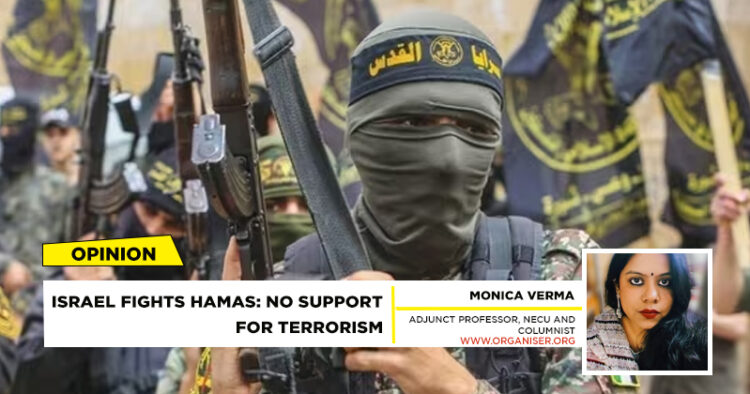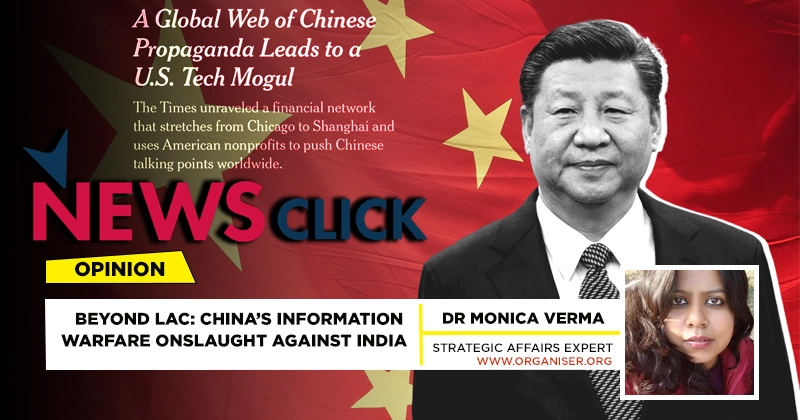The worst possible scenario for Israel has come true last week with the terror strike by Hamas on its soil. Even as gory visuals of bloodbath on Israeli streets are pouring in, many world leaders have condemned the attacks in the strongest possible manner. In this, the stand taken by Bharat’s Narendra Modi government is particularly notable for its clarity.
A few hours after violence was unleashed by Hamas against innocent Israelis on Saturday last week, Prime Minister Narendra Modi posted a statement on X (formerly Twitter): “Deeply shocked by the news of terrorist attacks in Israel. Our thoughts and prayers are with the innocent victims and their families. We stand in solidarity with Israel at this difficult hour”. His statement was later reposted by Foreign Affairs Minister Dr. S. Jaishankar as well.
Through this statement, Bharat has taken a very clear stand on the issue without mincing words. It has called out the ‘terrorist attack’ while also noting that Israel is a victim in the entire situation. This is important because a slew of nations including China have used their statements on the incident to make a political point on the Palestine cause as well. In fact, the Chinese statement did not even mention the terror attack by Hamas. Instead, it alluded to the need to end hostilities and focus on the two-state solution and establishment of an independent state of Palestine.
On a day when Hamas was defiling the dead-bodies of soldiers, gang-raping women, taking children and old people as hostages, it is tragic that China was thinking about the two-state solution and independent state of Palestine. But guess who else agreed with China and was issuing a similar statement on the terror attack— Bharat’s opposition parties! Although the Indian government took a strong stand against terrorism through its statement by condemning the attack, the opposition parties including the Congress and the Left were not satisfied. In fact, CPI (M) politburo member M.A. Baby has even condemned the government for mentioning only Israel unilaterally and breaking away from principle of non-alignment and anti-imperialism by drawing closer to Israel. Similarly, the Congress has passed a resolution in its Working Committee, backing the Palestinian cause without even mentioning the terror attack or showing any sympathy for the victims in Israel.
TERROR, NOT RESISTANCE
The point worth discussion here is that on a day when Israel has suffered one of the worst terror attacks in recent times, does it suit anyone to be bringing the larger Israel-Palestine conflict in the picture? Some days are for political discourse and political signalling to one’s vote banks but days like October 7, 2023 must be exclusively reserved for condemning terrorism in all its forms. After all, Hamas is not the voice of all the Palestinians. It is a terror outfit that thrives on support from Iran, Qatar, Turkey and even Pakistan and has been recognised as a terrorist organisation by multiple countries including US, UK, Japan, Australia and European Union. Its control is concentrated in the Gaza Strip and it doesn’t recognise any of the agreements signed between Israel and the Palestine Liberation Organisation.
Although Bharat, under Nehru, did not maintain deep ties with Israel, Israel still extended limited arms help to Bharat during the 1962, 1965 and 1971 wars
Between the two dominant political parties in Palestine, Fatah and Hamas, Fatah is the moderate one that not only recognises Israel but also believes that peaceful negotiations are the only way forward. In comparison, Hamas is a radical organisation that neither recognises Israel nor does it believe in negotiations with Tel Aviv. It only believes in violence which it calls as ‘armed resistance’. In reality Hamas’s methods are far from just ‘resistance’ as proven in the latest attack. The attacks have not only taken the lives of Israelis but many foreign nationals including from Nepal and Germany have died due to indiscriminate shootings. What the Indian opposition parties have failed to recognise is their plight and suffering.
Bharat itself has been a long-time victim of terrorism. What happened in Israel is something which seems familiar to India. We had our own transgression by Islamist terrorists in India during the 26/11 attacks. Our entire state of Jammu and Kashmir has suffered mindless violence for many decades.
CHANGE IN APPROACH
Since PM Modi has come to power, Bharat has emerged as one of the leading voices against terrorism across the world. Bharat is one of the major states that is pushing for adoption of a convention against terrorism at the United Nations. It was obvious that Bharat’s statement on the terror attack against Israel will unequivocally call out the menace that terrorism is. But does that mean PM Modi has completely abandoned the support to Palestine? Does calling out Hamas and condemning terror attack mean that Bharat’s commitment to two-state solution has got diluted under Modi? Not at all. In fact, the PM had himself backed an independent Palestine state during his visit to Ramallah, a city in the West Bank in 2018.
There has been a change in Bharat’s approach to the Israel-Palestine equation in the last ten years.
Earlier Bharat’s stand towards Israel was dictated by the prism of non-alignment and anti-imperialism. During the Nehruvian years, Bharat preferred to view the Israel-Palestine conflict from the lens of imperialism where Israel was the occupying power and Palestine was the one which was oppressed. There was also an element of domestic politics involved where the sensibilities of Bharat’s large Muslim population weighed-in on the calculations of Prime Minister Nehru in rejecting deepening of ties with Israel.
The end of cold war brought a shift in Bharat’s attitude when PM PV Narasimha Rao for the first time approved establishment of full diplomatic relations between Bharat and Israel. This was part of his non-ideological approach to foreign policy as much as it was a signal to the US that Bharat was now ready for a more fruitful engagement with the Americans. Interestingly, although Bharat under Nehru did not maintain deep ties with Israel, Israel still extended limited arms help to Bharat during the 1962 war with China and 1965 and 1971 wars with Pakistan.
PM Modi became the first ever Prime Minister to visit Israel. In the last decade, Bharat’s relations with Israel have deepened significantly with both countries even collaborating under various mega schemes such as the Make in India (Defence) initiative. Israel has become Bharat’s third largest weapon supplier behind Russia and the United States. But most importantly, today their ties stand independent of the Israel-Palestine equation. Bharat wants a two state solution but that’s an independent aspect of its approach to West Asia. Its ties with Israel have become a full spectrum of defence, economy and security cooperation. It is in this regards that PM Modi’s clear statement on terror attack in Israel needs to be appreciated.
Dr Monica Verma is a New Delhi-based strategic affairs expert. She is currently teaching International Relations at NECU as an adjunct faculty and her articles continue to appear on leading outlets.
























Comments